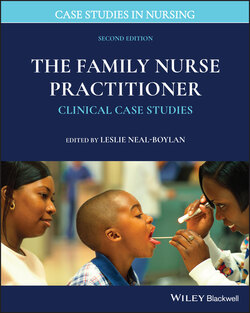Читать книгу The Family Nurse Practitioner - Группа авторов - Страница 43
ОглавлениеCase 5.1 Drug Use
By Anna Goddard, PhD, APRN, CPNP‐PC
SUBJECTIVE
Natalie is a 17 year‐old female who presents to the school‐based health center (SBHC) for the fourth time in 1 week with nonspecific complaints. Several teachers have reported Natalie falling asleep in class and “thinks she might be on drugs.” Her grades have continued to decrease this semester from C averages to barely passing most of her classes. Natalie reports she is tired “all the time” even though she claims to sleep 8–10 hours a night. She reports frequently waking up and not being able to fall back asleep. She does not like school and states “I don’t need anything I am learning in school.” When offered the PHQ2 and CRAFFT to complete as part of routine screening, she refused to complete both of them. She is requesting to be sent home.
Past medical history: Natalie was hospitalized once as an infant with wheezing and bronchitis. She reports no primary care provider and receives care at minute clinics, emergency rooms, or urgent care when needed.
Family history: Natalie’s mother has fibromyalgia, depression, and chronic headaches. Father’s history is unknown.
Social history: Natalie lives in a single‐parent household with her mother. No siblings live at home but she has half‐siblings who are no longer living at home; one is incarcerated and one has unknown whereabouts. Natalie has previously had detention for marijuana possession and has been caught juuling in class. Her grade averages are Ds and Fs and she is not on‐track to graduate this year. She admits to occasionally drinking with friends after school but has never blacked out and denies getting in the car while intoxicated. Natalie currently has a boyfriend but “it’s nothing serious” and has also been involved with females.
Psychiatric: Natalie has no history of a known diagnosis of trauma, depression, anxiety, or substance use disorder.
Medications: Natalie has a previous prescription for Lexapro 10 mg but reports “it wasn’t working” so she stopped taking it. The previous prescribing provider for Lexapro and age of treatment is unknown. She denies vitamins, supplements, or over‐the‐counter medications.
Allergies: Natalie has no known drug allergies (NKDA).
Review of systems: Natalie denies problems with weight gain or weight loss, fever, night sweats, or pain. She has no difficulty in hearing, runny nose, post‐nasal drip, or ear pain. She denies history of cardiovascular issues, shortness of breath, night sweats, prolonged cough, wheezing, or gastrointestinal issues.
OBJECTIVE
General: Natalie is dressed in leggings and an oversized sweatshirt with her hair in a ponytail, typical of adolescents.
Vital signs: Temperature: 98.8°F; heart rate: 70 beats per minute; BP: 118/60.
EENT: PERRLA, EOM intact, normal mucosa, no nasal discharge, swollen turbinates, tonsils 1+ with no exudate.
CV/Respiratory: Normal rate and rhythm. Lungs clear to auscultation with no wheezing and crackles.
Abdomen: Bowel sounds normal.
CRITICAL THINKING
1 What are the most likely differential diagnoses in this case and why?__Substance use/abuse__Alcohol use/abuse__Depression__School phobia__Sleep problems__Thyroid disorder
2 What are the top diagnostic tests required in this case and why?__Toxicology screen__Complete blood count (CBC) with differential__Complete metabolic panel (CMP)__Thyroid panel__Suicide assessment
3 What are the concerns at this point?
4 What is the plan of treatment?
5 What are the plans for referral and follow‐up care?
6 What health education should be provided to this patient?
7 Natalie asks, “Are you going to tell my mom about this?” How do you respond?
8 Does the patient’s psychosocial history impact how you might treat her?
9 Can minors seek substance abuse counseling without parental consent?
10 Are there any standardized guidelines that should be used to treat this case? If so, what are they?
